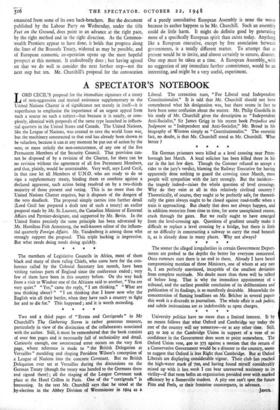A SPECTATOR 'S NOTEBOOK
LORD CECIL'S proposal for the immediate signature of a treaty of non-aggression and mutual assistance supplementary to the United Nations Charter is of significance not merely in itself—it is superfluous to emphasise the importance of an urgent appeal from such a source on such a subject—but because it is nearly, or com- pletely, identical with proposals of the same type launched in influen- tial quarters in the United States and Canada. The United Nations, like the League of Nations, was created to save the world from war, but the machinery constructed to that end has already been shown to be valueless, because it can at any moment be put out of action by the veto, or more strictly the non-concurrence, of any one of the five Permanent Members of the Security Council. That provision can- not be disposed of by a revision of the Charter, for there can be no revision without the agreement of all five Permanent Members, and that, plainly, would be unattainable. Very well, says Lord Cecil, in that case let all Members of U.N.O. who are ready to do so sign a supplementary treaty, binding them to combine against a declared aggressor, such action being resolved on by a two-thirds majority of those present and voting. This is no more than the United Nations Charter requires, but it disposes of the dangers of the veto deadlock. The proposal simply carries into further detail (Lord Cecil has prepared a draft text of such a treaty) an earlier proposal made by Mr. St. Laurent, the Canadian Minister of External Affairs and Premier-designate, and supported by Mr. Bevin. In the United States precisely the same principle has been advocated by Mr. Hamilton Fish Armstrong, the well-known editor of the influen- tial quarterly Foreign Affairs. Mr. Vandenberg is among those who strongly support the. proposal. This triple backing is impressive. But what needs doing needs doing quickly.
* * * *


































 Previous page
Previous page